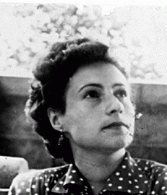
Susan Strauss
Born: January 9, 1926
Vacha, Germany
Susan grew up in Vacha, a small Thuringian town where her family had lived for more than 400 years. Her father, Herman, owned a general store and her mother, Bertha, took care of the home and children. Susan had a younger sister Brunhilde. The Strausses were one of about 25–30 Jewish families living in Vacha.
1933–39: Soon after the Nazis took power, many of Susan's friends stopped playing with her. In 1938 she was forced to leave the public school. That November, the Nazis unleashed a wave of pogroms throughout Germany known as Kristallnacht (“The Night of Broken Glass”). In Vacha, local party members damaged the family store and imprisoned her father in the Buchenwald concentration camp. He was released after four weeks on the condition that he quickly emigrate. In 1939 he fled to Belgium. Susan, her mother, grandmother, and sister moved to Berlin, where there was a large Jewish community.
1940–44: During the war, Susan was conscripted for forced labor and produced radio receivers for submarines. Her father reached the United States in 1940, but was unable to get his family out of Germany. In January 1942, Susan and her family were deported to the Riga ghetto in occupied Latvia. Upon arrival, her grandmother, Jettchen, was taken to the nearby forests and killed. Susan, her mother, and sister were placed in forced labor in the ghetto and at the Kaiserwald concentration camp. In fall 1944, as the Soviet army approached, they were deported to the Stutthof camp. From Stutthof, Susan was transferred to the subcamp of Sophienwalde, where the prisoners were forced to pave roads.
In February 1945, the SS sent the prisoners on a death march. Susan was liberated by Soviet troops on March 10, 1945. Her mother perished in the Thorn (Torun) labor camp and her sister at Stutthof. After the war, Susan married, and immigrated with her husband and family to the United States, where they joined her father.

